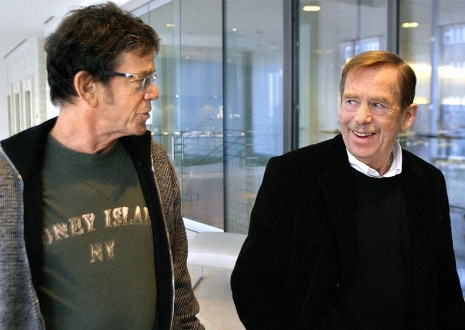
Velvet Underground meets Velvet Revolutionary
Vaclav Havel died today at the age of 75. A former chain smoker with chronic respiratory problems, Havel had been in failing health the past few months and died at his weekend home in Hradecek in the northern Czech Republic,
Czech independence leader, artist and human rights activist, Havel was elected the first president of a free Czechoslovakia since 1948 on December 29, 1989.
A prominent force in the Velvet Revolution, a bloodless overthrow of the communist regime in in Czechoslovakia, which returned democracy to Czechs after fifty years of Nazi occupation and communist rule, Havel was the very definition of a man of conscience. Soft-spoken, humble, impish and possessing a healthy sense of the absurd, Havel was that rare leader who chose the power of inspiration over rhetoric and empty gesture. He was a revolutionary who recognized that artistic creativity was every bit as important as political dogma or ideologies. Without the humanizing force of literature, theater and music and an understanding of the interconnectedness of all things , civilization is a hollow machine destined for spiritual starvation.
Himself a playwright, Havel was perhaps the only world leader who was closer to rock and rollers like Lou Reed, Frank Zappa and Keith Richards than politicians and bureaucrats. It is reputed that The Velvet Revolution was named after The Velvet Underground, whose music was made popular in Czechoslovakia by Prague’s radical avant-rock band The Plastic People.
Havel was a peacenik who somehow managed to navigate the treacherous waters of political power without losing his sense of perspective or soul.
Havel’s revolutionary message—which helped oust the world’s second strongest power from his country, but which Americans and in that moment the American Congress have not always been ready to hear—is that peace does not come by defeating enemies, it comes by making people free, governments democratic, and societies just. “The idea of human rights and freedoms must be an integral part of any meaningful world order. Yet, I think it must be anchored in a different place, and in a different way, than has been the case so far. If it is to be more than just a slogan mocked by half the world, it cannot be expressed in the language of a departing era, and it must not be mere froth floating on the subsiding waters of faith in a purely scientific relationship to the world.”
Today’s world, as we all know, is faced with multiple threats,” he said in 1993 in Athens, on accepting one of the countless honors he received. “From whichever angle I look at this menace, I always come to the conclusion that salvation can only come through a profound awakening of man to his own personal responsibility, which is at the same time a global responsibility. Thus, the only way to save our world, as I see it, lies in a democracy that recalls its ancient Greek roots: democracy based on an integral human personality personally answering for the fate of the community.
Without a global revolution in the sphere of human consciousness,” Havel told Congress, referring to a movement toward democracy, “nothing will change for the better in the sphere of our being as humans, and the catastrophe for which the world is headed—be it ecological, social, demographic, or a general breakdown of civilization—will be unavoidable. If we are no longer threatened by world war, or by the danger that the absurd mountains of nuclear weapons might blow up the world, this does not mean that we have definitely won. This is actually far from being a final victory.”
Havel speaks at the Forum for Creative Europe in March of 2009.
Matt Welch, Editor-in-Chief of Reason Magazine (no relation), on John Stossel’s eponymous Fox Business program, explaining the “Velvet” part of the “Velvet Revolution,” and how rebellious culture helped to dismantle the Soviet Union.